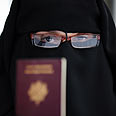
French parliament bans face veils
Bill fining men who force women to cover face will go on to Senate, where it will most likely pass
France's lower house of parliament has approved a ban on burqa-like Islamic veils, a move that is popular among French voters despite serious concerns from Muslim groups and human rights advocates.
There were 336 votes for the bill and just one against at the National Assembly. Most members of the main opposition group, the Socialist Party, refused to participate in the vote.
France is the second European country to impose such a ban, after Belgium's lower house of parliament approved a similar ban in April.
Following Tuesday's vote, the ban on face-covering veils will go in September to the Senate, where it also is likely to pass. Its biggest hurdle will likely come after that, when France's constitutional watchdog scrutinizes it.
If it is approved by the senate, the law will go into effect next year, in order to give citizens time to learn the new stipulations. Violators will be fined 150 euro or forced to undergo studies on the principles of citizenship in France, the bill states.
Initiators of the bill, which include President Nicolas Sarkozy, clarified that its aim is to fight oppression of women. Thus any man who forces a woman to cover her face in public will be fined a staggering 30,000 euro, or double that if the female is a minor.
France's justice minister, Michele Alliot-Marie, said last Tuesday that France "does not accept attacks on human dignity", or "tolerate the abuse of vulnerable people."
But the main body representing French Muslims says face-covering veils are not required by Islam, and it worries that the law will stigmatize all Muslims.
Amnesty International has urged French lawmakers to reject the bill, and a French anti-racism group, MRAP, which opposes such dress, has said a law would be "useless and dangerous." France's highest administrative body, the Council of State, warned in March that a total ban risks being found unconstitutional.
France's opposition Socialists agree with much of the draft law, although they say a ban shouldn't be applicable everywhere — just in certain places, such as government buildings, hospitals, public transport and banks.
"We're not going into this debate with a head-on attack," Jean-Marc Ayrault, who heads the Socialists in the French National Assembly, told AP. He said burqa-style veils "are a step backward that we want to fight."
Gilad Halpern contributed to this report










